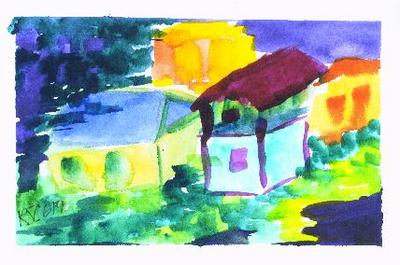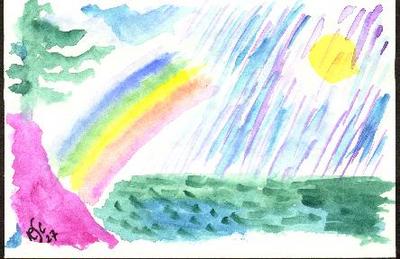American Life in Poetry: Column 027
BY TED KOOSER, U.S. POET LAUREATE
In this lovely poem by Angela Shaw, who
lives in Pennsylvania, we hear a voice of
wise counsel: Let the young go, let them
do as they will, and admire their grace
and beauty as they pass from us into the
future.
Children in a Field
They don't wade in so much as they are taken.
Deep in the day, in the deep of the field,
every current in the grasses whispers hurry
hurry, every yellow spreads its perfume
like a rumor, impelling them further on.
It is the way of girls. It is the sway
of their dresses in the summer trance--
light, their bare calves already far-gone
in green. What songs will they follow?
Whatever the wood warbles, whatever storm
or harm the border promises, whatever
calm. Let them go. Let them go traceless
through the high grass and into the willow--
blur, traceless across the lean blue glint
of the river, to the long dark bodies
of the conifers, and over the welcoming
threshold of nightfall.
Reprinted from "Poetry," September, 2004,
Vol. 184, No. 5, by permission of the
author. Poem copyright (c) 2004 by
Angela Shaw. This weekly column is
supported by The Poetry Foundation,
The Library of Congress, and the Department
of English at the University of Nebraska,
Lincoln. This column does not accept
unsolicited poetry.
******************************
9/30/2005
9/29/2005

American Life in Poetry: Column 026
BY TED KOOSER, U.S. POET LAUREATE
Descriptive poetry depends for its effects in part upon the vividness of details. Here the Virginia poet, Claudia Emerson, describes the type of old building all of us have seen but may not have stopped to look at carefully. And thoughtfully.
Stable
One rusty horseshoe hangs on a nail
above the door, still losing its luck,
and a work-collar swings, an empty
old noose. The silence waits, wild to be
broken by hoofbeat and heavy
harness slap, will founder but remain;
while, outside, above the stable,
eight, nine, now ten buzzards swing low
in lazy loops, a loose black warp
of patience, bearing the blank sky
like a pall of wind on mourning
wings. But the bones of this place are
long picked clean. Only the hayrake's
ribs still rise from the rampant grasses.
Poem copyright (c) 1997 by Claudia Emerson Andrews, a 2005 Witter Bynner Fellow of the Library of Congress. Reprinted from "Pharoah, Pharoah" (1997) by permission of the author, whose newest book, "Late Wife," will appear this fall; both collections are published by Louisiana State University's Southern Messenger Poets. This weekly column is supported by The Poetry Foundation, The Library of Congress, and the Department of English at the University of Nebraska, Lincoln. This column does not accept unsolicited poetry.
9/27/2005

American Life in Poetry: Column 025
BY TED KOOSER, U.S. POET LAUREATE
Emily Dickinson said that poems come at the truth at a slant. Here a birdbath and some overturned chairs on a nursing home lawn suggest the frailties of old age. Masterful poems choose the very best words and put them in the very best places, and Michigan poet Rodney Torreson has deftly chosen "ministers" for his first verb, an active verb that suggests the good work of the nursing home's chaplain.
The Bethlehem Nursing Home
A birdbath ministers
to the lawn chairs,
all toppled: a recliner
on its face, metal arms
trying to push it up;
an overturned rocker,
curvature of the spine.
Armchairs on their sides,
webbing unraveled.
One faces the flowers.
A director's chair folded,
as if prepared
to be taken up.
From "A Breathable Light," New Issues Poetry and Prose, 2002, and first published in "Cape Rock". Copyright (c) 2002 by Rodney Torreson; reprinted by permission of the author. This weekly column is supported by The Poetry Foundation, The Library of Congress, and the Department of English at the University of Nebraska, Lincoln. This column does not accept unsolicited poetry.
9/09/2005

American Life in Poetry: Column 024
BY TED KOOSER, U.S. POET LAUREATE
In this poem by New York poet Martin Walls, a common
insect is described and made vivid for us through a
number of fresh and engaging comparisons. Thus an
ordinary insect becomes something remarkable and
memorable.
Cicadas at the End of Summer
Whine as though a pine tree is bowing a broken violin,
As though a bandsaw cleaves a thousand thin sheets of
titanium;
They chime like freight wheels on a Norfolk Southern
slowing into town.
But all you ever see is the silence.
Husks, glued to the underside of maple leaves.
With their nineteen fifties Bakelite lines they'd do
just as well hanging from the ceiling of a space
museum--
What cicadas leave behind is a kind of crystallized memory;
The stubborn detail of, the shape around a life turned
The color of forgotten things: a cold broth of tea & milk
in the bottom of a mug.
Or skin on an old tin of varnish you have to lift with
lineman's pliers.
A fly paper that hung thirty years in Bird Cooper's pantry
in Brighton.
Reprinted from "Small Human Detail in Care of National Trust,"
New Issues Press, Western Michigan University, 2000,
by permission of the author. Poem copyright (c) by Martin
Walls, a 2005 Wytter Bynner Fellow of the Library of Congress.
His latest collection "Commonwealth" is available from
March Street Press. This weekly column is supported by
The Poetry Foundation, The Library of Congress, and the
Department of English at the University of Nebraska, Lincoln.
This column does not accept unsolicited poetry.
******************************
9/05/2005

by Ann McNeal
Writing
You live
For the high windy days
When clouds tumble like metaphors
Across your mind
July evenings with so many
Hermit thrushes their song
Lines tangle in the air
The rest of the days, rain
Or else heat and humility
Sticky weather
Thighs to chair
Paper to itself
Images to gray pavement
You struggle to survive
The rain-slant of November
Mud of April
Each day with
Its own mocking
Grace
-originally appeared in Patchwork Journal, Issue 4, 2004.
9/01/2005

by Catherine Jagoe
GREEN HUMMINGBIRD
I will not forget the summer I forced myself
out onto the deck and sat there in despair,
swollen-eyed, slatternly, my throat raw,
my head heavy with drugs that made me
endlessly sleep and eat but did not cure my pain,
how you suddenly appeared, suspended
in mid-air, a jewelled messenger
on wings of living, iridescent green.
The ruby at your throat glowed in the sun
as our eyes met. No one else saw you.
I knew your message was yourself: green
flame of concentrated life, scrap of pure
unbounded energy. The next time I labored
under the same weight, you reappeared:
hovering between the lilacs and the bleeding heart.
-originally appeared in Red Wheelbarrow
Subscribe to:
Posts (Atom)



